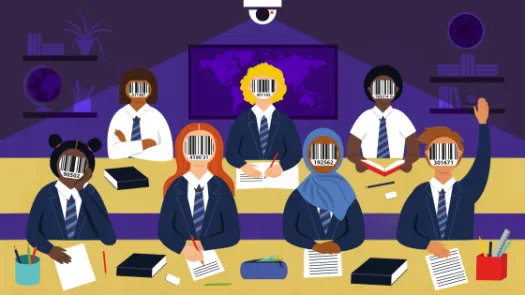
PI’s submission on the right to be safe in education
Our submission to the UN Special Rapporteur on the right to education report on safety as a precondition for its full realisation highlighted the negative impacts of surveillance technologies in education.
The Special Rapporteur on the right to education, in her report to the Human Rights Council, established that "facial recognition must be banned in all educational settings" reflecting the recommendations in our submission. The Report, further reflecting our concerns, highlighted that facial recognition is one of the most intrusive that has far-reaching implications. It added that "surveillance curtails the ease with which people raise questions, share information and seek access to resources. It hinders independent thinking and identity development and it affects how people behave and interact in educational spaces".

We have been concerned about the expansion of EdTech includes a wide range of tools that enable the surveillance of students and academic staff, often facilitating monitoring by both public authorities and private entities.
We brought our concerns responding to the UN Special Rapporteur on education call for contributions on safety as an element of the right to education and a precondition for its full realization.
We considered this report an essential platform to examine the complex interplay between surveillance and the creation of a secure learning environment—one that is free from threats of violence and discrimination—and to highlight how surveillance endangers students’ opportunities to learn in a safe and supportive space.
In our submission, we recommended the UN Special Rapporteur to call on states to:
- Conduct human rights due diligence, including human rights and data protection impact assessments: This includes assessing the potential adverse human rights impacts on safety as an integral element of the right to education.
- Conduct necessity and proportionality analysis: In the deployment and implementation of EdTech in educational settings, relevant stakeholders must consistently assess whether the use of privacy-intrusive technologies is necessary and if less intrusive alternatives could achieve the same purpose. When assessing proportionality, stakeholders must evaluate whether the use of EdTech is proportionate to the intended goal and if it is the least intrusive option available.
- Introduce data protection safeguards in EdTech: The development and implementation of EdTech must adhere to robust data protection frameworks. Authorities should establish a clear legal basis for data collection, and relevant stakeholders should conduct necessary data protection impact assessments, ensuring the implementation of strong data security measures to safeguard students' personal information.
- Ensure transparency in the development and implementation of EdTech: This includes disclosing the scope and functioning of the technology, any commercial arrangements with private entities, error rates, impact assessments, and potential oversight mechanisms to ensure accountability.
- Implement safeguards in public-private partnerships: Public authorities, private companies, and relevant stakeholders involved in EdTech partnerships should implement safeguards grounded in principles of transparency, accountability, legality, necessity, proportionality, and oversight. These safeguards should ensure that human rights are respected and that obligations under the United Nations Guiding Principles on Business and Human Rights are fully upheld.
- Ban facial recognition technology (FRT) and emotional recognition systems in educational settings: Facial recognition technology (FRT) and emotional recognition systems should be prohibited in educational settings and their use stopped due to their disproportionate security risks, inaccuracies, and discriminatory biases. These technologies pose significant threats to the right to education and may undermine students' privacy and security.
The Report of the Special Rapporteur on the right to education on the right to be safe in education (UN Doc A/HRC/59/41) was published on 27 May 2025.

